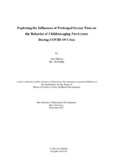Exploring the influences of prolonged screen time on the behavior of children aging 3 to 6 years during Covid-19 crisis
Abstract
Prolonged screen time exposure had been a soaring concern for children in last two decades but COVID-19 pandemic exacerbated this phenomenon. The aim of this quantitative research was to explore the consequences of prolonged screen time on 3 to 6 years children‟s behavior during COVID-19. The survey was conducted on an online platform with 40 mothers who had 3 to 6 years old children. Strength and Difficulties Questionnaire (SDQ) and Socio-Economic Status (SES) questionnaire were used to collect data. The study showed 91% of mothers believed that prolonged screen time has negative effect on children. The average screen time per child was 3.08 hours which indicates that each of them was exposed to prolonged screen time (more than 2 hours). Mothers noticed children changing behavior due to prolonged screen time during pandemic. As per mothers‟ reflection, children exhibited hyperactivity (52.50%), attention problems (42.50%), reduced interest in studying (37.50%) and aggressive behavior (27.50%). Study also discovered that children who spent prolonged time on screen had more behavior problems than those who were exposed to non-prolonged screen time. Awareness and education is a necessity to initiate healthy digital habits and educate the caregivers and parents regarding the short and long term effects of prolonged screen time.

